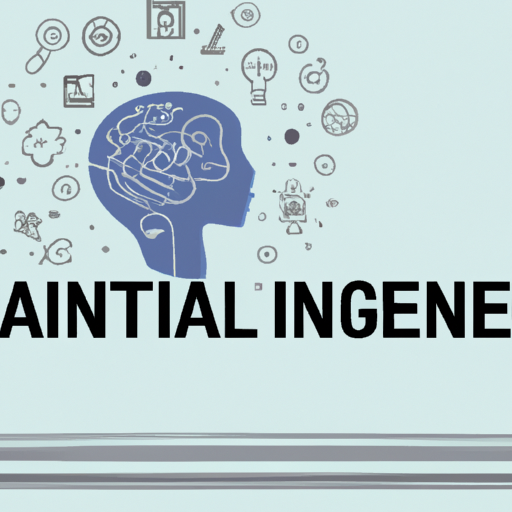
"The Future of AI: How Machine Learning is Revolutionizing Industries"
-
Table of Contents
“Unlock the Possibilities of the Future with AI and Machine Learning!”
Introduction
The future of Artificial Intelligence (AI) is an exciting and rapidly evolving field. AI has the potential to revolutionize many industries, from healthcare to finance, and is already making a huge impact on the way we live and work. Machine learning is a key component of AI, and is being used to create smarter, more efficient systems that can automate tasks and make decisions faster and more accurately than ever before. In this article, we will explore how machine learning is revolutionizing industries and what the future of AI holds.
How AI is Transforming the Healthcare Industry
The healthcare industry is undergoing a major transformation due to the emergence of artificial intelligence (AI). AI is revolutionizing the way healthcare is delivered, from diagnosis and treatment to patient care and management. AI is being used to improve the accuracy and speed of diagnosis, reduce medical errors, and improve patient outcomes.
AI is being used to analyze medical images such as X-rays, CT scans, and MRIs. AI algorithms can detect patterns in the images that may be indicative of a particular disease or condition. This can help doctors make more accurate diagnoses and provide more effective treatments. AI is also being used to analyze patient data to identify potential health risks and provide personalized care plans.
AI is also being used to automate administrative tasks such as scheduling appointments, managing patient records, and billing. This can help reduce costs and improve efficiency. AI is also being used to provide virtual assistants to help patients with their medical needs. These virtual assistants can provide information about symptoms, medications, and treatments, as well as provide reminders for appointments and medication refills.
AI is also being used to improve the accuracy of medical research. AI algorithms can analyze large amounts of data to identify patterns and correlations that may be useful in developing new treatments and therapies. AI can also be used to identify potential drug targets and develop new drugs.
AI is transforming the healthcare industry in many ways. It is helping to improve the accuracy and speed of diagnosis, reduce medical errors, and improve patient outcomes. It is also helping to automate administrative tasks and provide virtual assistants to help patients with their medical needs. Finally, it is helping to improve the accuracy of medical research and develop new treatments and therapies. AI is revolutionizing the way healthcare is delivered and is set to have a major impact on the industry in the years to come.
The Impact of AI on the Automotive Industry
The automotive industry is undergoing a major transformation due to the emergence of artificial intelligence (AI). AI is revolutionizing the way cars are designed, manufactured, and operated, and is having a profound impact on the industry.
AI is being used to improve the design and manufacturing of cars. Automakers are using AI to create more efficient and cost-effective designs. AI-driven design tools can quickly generate thousands of design options, allowing automakers to quickly identify the most efficient and cost-effective designs. AI is also being used to automate the manufacturing process, allowing automakers to produce cars faster and with fewer errors.
AI is also being used to improve the safety and performance of cars. Automakers are using AI to develop advanced driver assistance systems (ADAS) that can detect and respond to potential hazards on the road. AI-powered systems can also be used to optimize the performance of cars, allowing them to accelerate and brake more efficiently.
Finally, AI is being used to improve the customer experience. Automakers are using AI to develop personalized services that can anticipate customer needs and provide tailored recommendations. AI-powered systems can also be used to provide real-time feedback on driving performance, allowing drivers to make adjustments to improve their driving.
In conclusion, AI is having a profound impact on the automotive industry. AI is being used to improve the design, manufacturing, safety, and performance of cars, as well as to improve the customer experience. As AI continues to evolve, it will continue to revolutionize the automotive industry.
The Role of AI in the Financial Services Industry
The financial services industry is undergoing a rapid transformation due to the emergence of artificial intelligence (AI). AI is a form of technology that enables machines to learn from experience, adjust to new inputs, and perform tasks that would otherwise require human intelligence. AI is being used in the financial services industry to automate processes, improve customer service, and reduce costs.
AI is being used to automate processes in the financial services industry. AI-driven automation can help streamline operations, reduce manual labor, and improve accuracy. AI-driven automation can also help reduce costs by eliminating the need for manual labor and reducing the time it takes to complete tasks. AI-driven automation can also help reduce the risk of errors and fraud by providing more accurate data and insights.
AI is also being used to improve customer service in the financial services industry. AI-driven customer service solutions can help provide personalized customer experiences, improve customer satisfaction, and reduce customer service costs. AI-driven customer service solutions can also help identify customer needs and provide tailored solutions.
Finally, AI is being used to reduce costs in the financial services industry. AI-driven solutions can help reduce operational costs by automating processes, reducing manual labor, and improving accuracy. AI-driven solutions can also help reduce costs by providing more accurate data and insights.
In conclusion, AI is playing an increasingly important role in the financial services industry. AI-driven solutions are helping to automate processes, improve customer service, and reduce costs. As AI continues to evolve, it is likely that its role in the financial services industry will continue to grow.
The Potential of AI in the Education Sector
The potential of Artificial Intelligence (AI) in the education sector is immense. AI has the potential to revolutionize the way we learn, teach, and assess students. AI can be used to personalize learning experiences, automate administrative tasks, and provide real-time feedback to students.
AI can be used to personalize learning experiences by providing tailored content to each student. AI can analyze data from a student’s past performance and use it to create a personalized learning plan. This plan can be tailored to the student’s individual needs and interests, allowing them to learn more effectively. AI can also be used to provide real-time feedback to students, allowing them to adjust their learning strategies as needed.
AI can also be used to automate administrative tasks such as grading and attendance tracking. AI can analyze student data and provide teachers with insights into student performance. This can help teachers identify areas of improvement and provide targeted instruction to help students succeed. AI can also be used to automate the grading process, allowing teachers to spend more time on instruction and less time on grading.
Finally, AI can be used to provide personalized learning experiences to students. AI can analyze data from a student’s past performance and use it to create a personalized learning plan. This plan can be tailored to the student’s individual needs and interests, allowing them to learn more effectively. AI can also be used to provide real-time feedback to students, allowing them to adjust their learning strategies as needed.
In conclusion, the potential of AI in the education sector is immense. AI can be used to personalize learning experiences, automate administrative tasks, and provide real-time feedback to students. AI has the potential to revolutionize the way we learn, teach, and assess students.
The Benefits of AI in the Retail Industry
The retail industry is rapidly evolving, and Artificial Intelligence (AI) is playing a major role in this transformation. AI is revolutionizing the retail industry by providing retailers with the ability to better understand customer behavior, optimize operations, and improve customer service.
AI can be used to analyze customer data to gain insights into customer preferences and buying habits. This data can be used to create personalized shopping experiences, such as product recommendations and targeted promotions. AI can also be used to automate customer service tasks, such as responding to customer inquiries and providing product recommendations.
AI can also be used to optimize operations. AI-powered robots can be used to automate warehouse operations, such as picking and packing orders. AI can also be used to optimize inventory management, helping retailers to better predict demand and ensure that the right products are in stock at the right time.
Finally, AI can be used to improve customer service. AI-powered chatbots can be used to provide customers with quick and accurate answers to their questions. AI can also be used to automate customer service tasks, such as responding to customer inquiries and providing product recommendations.
In summary, AI is revolutionizing the retail industry by providing retailers with the ability to better understand customer behavior, optimize operations, and improve customer service. AI is helping retailers to create personalized shopping experiences, automate operations, and improve customer service. As AI continues to evolve, it will become an increasingly important tool for retailers to stay competitive in the ever-changing retail landscape.
Conclusion
The Future of AI is an exciting and rapidly evolving field. With the advancements in machine learning, AI is revolutionizing industries and creating new opportunities for businesses to increase efficiency, reduce costs, and improve customer service. As AI continues to develop, it will become an increasingly important part of our lives and the way we do business. With the right investments and strategies, businesses can take advantage of the potential of AI to create a more efficient and profitable future.








